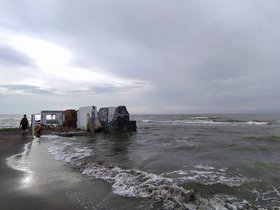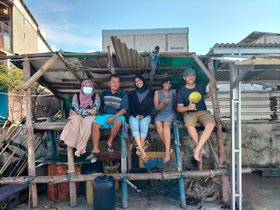BlueUrban: Fieldwork in Jakarta and Semarang, June 2022
by Johannes Herbeck (Uni-Bremen) and Rapti Siriwardane (Leibniz-ZMT Bremen)
As part of the empirical program within the BlueUrban-project, Rapti Siriwardane and Johannes Herbeck were on fieldwork in Jakarta and Semarang, Indonesia between late May until the end of June 2022. After a training phase on ethnographically-inspired methods for an interdisciplinary team of researchers of Universitas Indonesia, all involved researchers spent several days visiting older field sites in North Jakarta (Kamal Muara, Kampung Akuarium) to understand the afterlives of seawall construction and artificial island reclamation, and their implications on low-income post-pandemic spaces of informality.
Following these brief revisits of earlier work, the team went on to exploring two case studies identified in Semarang. The focus here was on following and tracing knowledge networks that experiment with two distinct yet interrelated coastal adaptation practices/paradigms: ‘multifunctionality’ in terms of dyking and ‘floating’ design with respect to housing and public space. Interviews were led with teams of civil engineers who overlook the construction of a multifunctional dike/toll road connecting Semarang and Demak, with university groups and planning teams in Jakarta and Semarang that experiment with different forms of hybrid traditional-modernist methods of building on water, with local authorities involved in coastal planning and infrastructure development, with NGOs and advocacy groups, etc.
Our field explorations were embedded in broader questions relating to speculative futuristic visions of coastal city-making, and the im/possibilities that contemporary real estate legislature, land tenure and property ownership together with socio-cultural value systems place upon experiments that seek alternative ways of living with tidal flux. Furthermore, in order to understand the complexities governing community-based adaptation practices and the potential impacts that larger-scale technological interventions have had, the team visited littoral communities both in Semarang and Jakarta that are not only fast subsiding due to relative sea level rise but are also left contending with the negative coastal impacts of overbuilt protective infrastructure.
Other activities during the stay also entailed two hybrid talks, a Studium Generale at the Department of Civil Engineering at Universitas Islam Sultan Agung (Unissula) in Semarang, and a research seminar at the National Research and Innovation Agency (Badan Riset dan Inovasi Nasional, BRIN formerly LIPI) in Jakarta.
This empirical work will continue into the coming months, with regular cross-disciplinary training and co-learning sessions spanning diverse research methods and exchange formats between researchers at Universitas Indonesia, Leibniz-ZMT, and the Sustainability Research Center (artec), University of Bremen.
New publication:
Herbeck, J., Siriwardane-de Zoysa, R. (2022). Transformations of Urban Coastal Nature(s): Meanings and Paradoxes of Nature-Based Solutions for Climate Adaptation in Southeast Asia. In: Misiune, I., Depellegrin, D., Egarter Vigl, L. (eds) Human-Nature Interactions. Springer, Cham. https://doi.org/10.1007/978-3-031-01980-7_6


